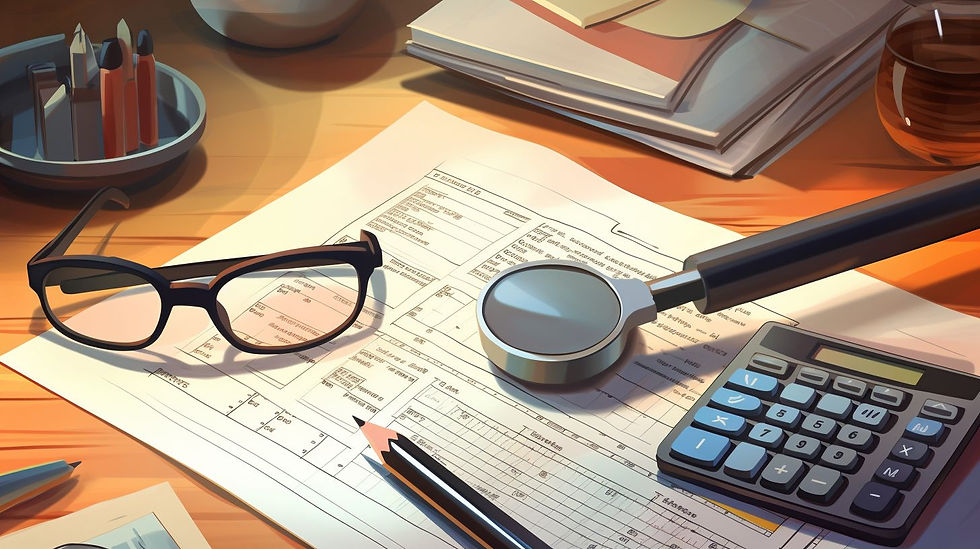5 Things To Look For In A Utility Bill Audit
- Mike
- Oct 18, 2023
- 5 min read

Facing high utility bills? You're not alone. In fact, many businesses overspend on utilities due to errors or overcharges. This article will guide you through 5 key aspects of a comprehensive utility bill audit - a helpful tool in identifying these extra costs and reducing future expenses.
Ready to uncover some surprising savings? Keep reading!
Key Takeaways
A utility bill audit checks for errors and overcharges in your energy bills.
It looks at how much power you use, rate plans and tax breaks. It also finds clerical mistakes on the bills.
Utility audits can help save money by finding lower rates or better usage plans.
Sometimes a mistake on old bills could mean that money comes back to you.

Understanding the Utility Bill Audit
A utility bill audit checks your energy usage bills. It is done by utility bill auditors. They make sure that you are not paying more than you need to for electricity, water, gas and other services.
The audit looks at current meter readings and past bills as well.
In a deeper look, these experts study how much energy was used in a month or year. They check each line of the bills from all utility providers. This shows if there were any billing errors or overcharges.
Also, they analyze rate structures to see if better plans exist for future savings. Sometimes changes in rules lead to lower costs that some people don't know about yet.
The audit also puts focus on growth trends and tax exemptions.The aim here is to spot anomalies and find ways the company may save money through taxes.
Lastly, clerical errors are checked too.Even small mistakes can cost extra fees.So this step makes sure everything adds up right.
So now we know what a utility bill audit means.It helps us see how we can spend less on our power needs.Audit results might even suggest smarter ways to use vital resources like water or electricity.This may end up bringing back some cash too!
The Five Crucial Aspects of a Utility Bill Audit

This section delves into the significant components of a utility bill audit, focusing on reviewing energy usage numbers, analyzing rate structures, monitoring growth trends, investigating potential tax exemptions, and meticulously checking for clerical errors.
Reviewing the Numbers
Looking at the numbers is a key task in a utility bill audit. We check all data in your electricity, water and gas bills. This step spots overcharges or billing errors that can cost you money.
Rates and usage are compared to current meter readings to make sure they match. Dissimilarities might mean there's an error.
By this method, we find out if you're paying more for your utilities than you should be. The goal is to avoid unnecessary utility bill costs and save money where possible. With these findings, your company can make important changes for future savings.
Analyzing Rate Structures
Looking at rate structures is key in a utility bill audit. Good utility auditors know this and use it to look for cost savings. They check the rates offered by utility providers to see if your business has the best one.
Sometimes, they find you are overpaying because of outdated or wrong rate structures.
This part of the audit also seeks out alternative plans for future savings. These could be new options from your current service provider or other companies with cheaper rates. No one wants to pay more when there are low-cost options available! So, checking rate structures can help switch you to a less expensive plan that suits your energy usage numbers better.
Monitoring Growth Trends
In a utility bill audit, part of the process is keeping an eye on growth trends. This helps you to see how your usage changes over time. Here are some steps involved:
Check past records to see if there's been a rise in cost or usage.
Look at the current meter readings and compare it with older ones.
Try to find out why there's an increase if one is observed.
Use tools like WatchWire for real - time monitoring.
Keep track of energy usage numbers every month.
Notice any patterns or shifts in utility trends.
Look at the reasons for these changes and plan for future savings.
Spot anomalies and growth factors in your utility data analysis.
Investigating Tax Exemptions
Look closely at tax exemptions during a utility bill audit. Utility firms can miss this part in the final bill settlement. Tax benefits lower your utility costs. Work with a utility recovery and invoice auditing services company to ensure you get the right exemptions.
They can help you save money on electricity, water and gas bills.
Checking for Clerical Errors
Mistakes can happen. They also often show up on utility bills. Such mistakes are called clerical errors. Common ones include wrong meter readings and overcharges. These errors can hide in plain sight, leading to high costs.
A utility bill audit spots these errors. It uses tools and expert eyes to find mistakes on your water, gas or power bill. The aim is clear – catch the error before you overpay! An audit ensures that every charge matches usage data from utility service providers.
Catching clerical errors early helps save money for a business or non-profit group. Utility Bill Auditing Company offers such audits as part of their services. Bring them onboard if hiring an in-house expert seems too costly for you.
Please note that not all clerical errors mean bad news! Sometimes, they may lead to refunds due to past over-payments! So let's start checking those bills closely from now on.
Check your utility bill closely. You could save a lot of money. Look at the numbers, rates, growth trends, tax breaks, and clerical mistakes. It may just change your business for good!
FAQs
1. What is a utility bill audit?
A utility bill audit is when utilities experts review your electric, gas, water, sewage, and waste bills to find money refund or savings.
2. How can a utility bill management help me save money?
Utility data analytics look for payment errors and high usage in your bills. They also check the rate calculation and negotiate new contract terms for cost reduction.
3. Can a one-time utility bill audit find all billing discrepancies in my natural gas and telecom bills?
A one-time audit may not find all errors but it helps in identifying late fees, opening or closing of accounts issues and vendor evaluation problems that could lead to refunds.
4. Why should I outsource this task instead of using an in-house expert?
An outsourced specialist has more industry experience reviewing utilities and billings than an in-house expert might have which leads to better energy-saving practices.
5. How can seer system audits help with my monthly utility audits at my multi-site operation?
Sewer systems audits spot any errors on the residential site like incorrect tariffs structures or high consumption rates which aids monthly utility audits.
6. What benefits does auditing services offer besides immediate cost-savings?
Audit services provide sustainable technology solutions that promote efficient use of resources reducing overhead costs & future bills helping you become environmentally responsible.



